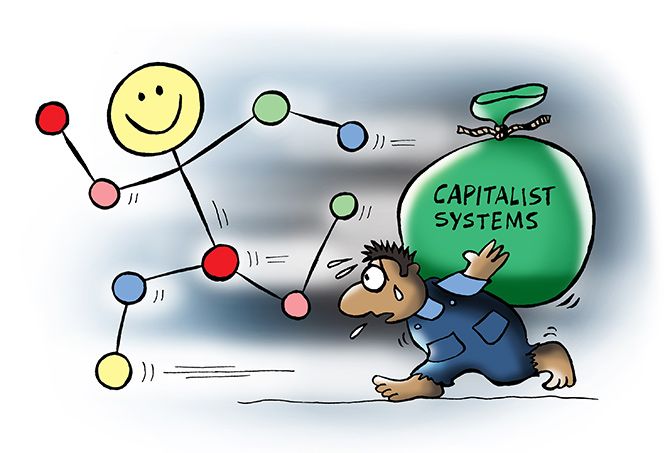'What's the point in lamenting widespread toxic work culture, and the capitalist system that gives rise to it if there is no alternative?'
'Actually, there is,' says Ashish Sharma.
Illustration: Uttam Ghosh/Rediff.com

Uber was in the news over the past few months for its 'toxic work culture' and its CEO, Travis Kalanick, finally stepped down.
The allegedly aggressive, unrestrained workplace culture reportedly resulted from pressure on executives to make money for the 'ride-sharing' company. But the truth is, this 'toxic work culture' is not limited to Uber.
It is widespread in a capitalist system where most of us have either been its victim or its perpetrator.
Hence, some tears for Kalanick, who was unlucky enough to get targeted. As someone said, "In a closed society where everybody's guilty, the only crime is getting caught."
But what's the point in lamenting widespread toxic work culture, and the capitalist system that gives rise to it if there is no alternative?
Actually, there is.
Technologies such as the Internet have given rise to a system where everything is free, because the additional cost of producing and 'sharing' anything drops to zero, thanks to heightened productivity.
Peer-to-peer 'e-book sharing' Web sites like Library Genesis and Sci-Hub are an example.
Custodians.online's letter in solidarity with so-called pirate Web sites Library Genesis and Sci-Hub says, 'We demonstrate daily... that the (capitalist) system is broken. We share our writing (with Library Genesis and Sci-Hub) secretly behind the backs of our publishers, circumvent paywalls to access articles and publications, digitise and upload books... to make them accessible... not to make property of... our Knowledge Commons.'
Such sharing systems, which do not operate on the profit principle and which oppose the capitalist economy, promise to deliver social justice, which is a far cry from the toxic work culture of today.
But Uber is a ride-sharing company, right, so what happened to the idea of social justice here?
Well, Uber is not really a ride-sharing company and unlike Library Genesis and Sci-Hub, profit is its main motive, not sharing.
Experts often refer to Airbnb, Uber and others as sharing peer-to-peer platforms -- where peers create and share value, like they do on Library Genesis and Sci-Hub -- but these businesses have little to do with peer-to-peer sharing or peer-to-peer value creation.
In fact, their success can be put down to zero sharing and full aggregation.
Uber aggregates driving services, with profit as its prime motive, and a reportedly aggressive, unrestrained work culture as its direct result.
Today, if you want to re-order the economy to deliver participation, choice and, most important, a toxin-free work culture that promises social justice, if you want to tear up the top-down vertical systems created by capitalism in its relentless search of profits, it's the true-blue sharing models (not aggregating ones) you would start from.
In fact, a glamorous step in this direction was the arrival of Bitcoin after the 2008 financial crisis, as if in response to the failings of the capitalist market.
A person, or persons, named Satoshi Nakamoto outlined a new protocol for a sharing peer-to-peer electronic cash system using a digital currency called Bitcoin, without profit as motive.
Distributed computation among peers' systems ensured the integrity of the data exchanged among billions of devices without any centralised third party such as Uber standing as an intermediary.
Thus, transactions between two or more parties were authenticated by mass collaboration among peers in a decentralised way.
Contrast this with centralised third parties such as Uber, PayPal, Visa and the government, which act as powerful intermediaries to authenticate transactions but, motivated by profit, cream off much of the value of transactions.
The Bitcoin system never does that, courtesy its visionary creator(s).
Also, think of the day when more such visionary creators come along and provide peer-to-peer applications in every sector, not just money, to put centralised authorities like Uber out of business.
If a distributed peer-to-peer application can create trust in the world of financial transactions (Bitcoin), why not taxi-aggregation services, which come with a number of trust problems: Driver accounts have been hacked, rides are subject to surge pricing and passengers have been subject to reckless driving and sexual harassment or assault.
In fact, a paper by economists at the Centre for Blockchain Technologies at University College London and The Impact Institute proposes exactly that: The creation of distributed application technologies to enable real sharing economy without intermediaries and central hubs, where all transactions between consumers and service providers are routed through decentralised, peer-to-peer networks.
Hopefully, trust and social justice will prevail when such decentralised networks trump top-down capitalist systems.












 © 2025
© 2025